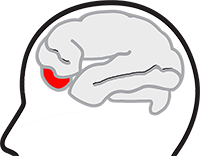FAQ about
Cluster Headache
Any questions about Cluster Headache?
OUCH Belgium answers you!
Another question? Contact us !
Can I die from this disorder?
No! Absolutely not!
Cluster Headache is … only pain…
However, the abuse of certain treatments can be fatal. Always talk to your neurologist and absolutely avoid self-medication!
In addition, there have been reports of passive suicidal thoughts, active suicidal thoughts, suicide planning and attempted suicide. Talk about it!
What causes Cluster Headache?
The cause(s) of cluster headache (CH) are not fully understood.
A direct link has sometimes been observed with a physical or psychological trauma, but in general, no cause has been identified.
What we do know is that the hypothalamus is the site of intense activity during an attack. There also seems to be a link with the CGRP neuropeptide, but that is about all we know.
Is Cluster Headache hereditary?
Some people appear to have a genetic predisposition to the disorder and it can, in rare cases, be passed on to children.
A genetic cause has been suggested in studies of families and twins, but the mode of transmission appears to vary and the degree of heritability is unclear. The number of genetic association studies on variants involved in the pathophysiology of the headache is limited.
It is said that the cluster headache is episodic, but this is not the case for me. Is this normal?
Attacks almost always occur at the same times (circadian rhythm). For episodic patients, they occur around the same times of the year (circannual rhythm)
However, some people are said to be “chronic“. This means that they don’t/almost don’t have a remission period during the year apart from a few rare breaks not exceeding 3 months per year.
Who is affected by Cluster Headache?
It is currently estimated that there are approximately 4 times more men than women with cluster headache. However, this ratio is changing.
The cause could be (widely accepted hypothesis) the fact that women’s lifestyles (tobacco, occupations) are becoming more similar to men’s. It can also be said that the feminisation of the medical profession leads to women being more listened to.
What age range is affected?
Statistically, cluster headache is more likely to affect young adults. However, first attacks can happen to a senior and children sometimes also suffer from cluster headache.
Will my cluster headache become more and more painful?
No, not really. The attacks by themselves do not leave neurological sequelae and therefore don’t lead to a worsening of the situation.
It is possible to go from chronic cluster headache to episodic cluster headache or, conversely, from episodic cluster headache to chronic cluster headache. However, it is rare that the frequency of attacks increases significantly. Of course, becoming chronic with several attacks per day makes the “beast” more difficult to handle.
Will I suffer from cluster headache for the rest of my life?
Notwithstanding the hope of advances in research, you can anticipate that your CH may disappear as suddenly and as inexplicably as it appeared. There are no statistics on this matter for a very simple reason- the ex-CH don’t get in touch with their neurologist to tell them “I haven’t had an attack in years”. However, directly or indirectly, we are aware of several cases of remission that are permanent or that have lasted for two or three decades.
My attacks don't always occur on the same side, is this normal?
Yes. Cluster headache normally affects only one side of the face, which is generally always the same. However, it can happen that there is a shift from one side to the other. It can also happen that both sides of the face are affected at the same time (rare).
I have been diagnosed with cluster headache but I do not fit the usual profile.
This is normal! It may happen that you only have some of the symptoms. It can be said that some are more characteristic than others (restlessness during attacks, for example).
I think I'm suffering from cluster headache. How can I be sure that I have it?
Go to a neurologist who specialises in headaches (one criterion: if you specify cluster headache and you are given an appointment in 6 months, this often means that it is better to look elsewhere).
Please note: the differential diagnosis between cluster headache and certain other headaches is often difficult! This means you should not self-diagnose.
Additional tests. These are prescribed to rule out the possibility of a secondary headache (i.e. caused by another disease) or to say whether or not you have a different type of headache.

